How London Responded to Beijing in the 2012 Olympics Opening Ceremony Fan Yang / University of Maryland, Baltimore County
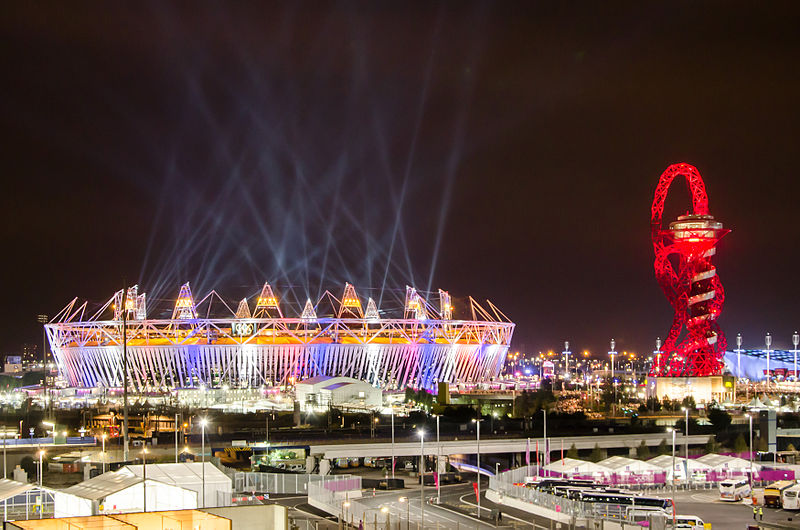
The shadow of Beijing looms large in Danny Boyle’s 2012 London Olympics Opening Ceremony, whether one admits it or not. The spectacle on July 27 has done everything to out-perform the 2008 Beijing extravaganza by following a rather simple strategy: whatever China did, we do the opposite. Since China was serious, we go for the light-hearted. China’s was a dream of orderliness and harmony, orchestrated within a collective ethos; ours would be one of chaos and cacophony, only because we celebrate individualized freedom.1 If China’s self-projection manifested the Communist Party’s burning desire to be recognized globally, we might as well throw a big party to show them how we rule (as an older global power).
One could even add that the tribute to Tim Burners-Lee’s invention of the World Wide Web served as a populist counter-point to the Chinese high-tech frenzy, rendered through director Zhang Yimou’s mechanized “state aesthetics.” “This is for everyone,” Burners-Lee’s line, has seemingly set the tone for the London ceremony, as an event of, for and by “the people.”
In his Oscar-winning Slumdog Millionaire (2009), Boyle has already demonstrated his ability to subsume a seemingly realist depiction of the subaltern – in this case the poverty-stricken underworld of Mumbai, India – within a familiar narrative of Hollywood (if not Bollywood) romance. He is as skillful in providing a quasi-critique on the globalized reality TV franchise (Who Wants to Be A Millionaire) as in embracing the principles that sustain its success. In this sense, Boyle indeed “wins the Gold” in London. He wins it in the same way he won the Oscar, by representing the masses in a manner that is in line with the long-standing ideological operation of the culture industry. But he also arguably succeeds in carrying the apparatus to a new level in the age of reality TV.
This, again, may be seen as a response to Beijing. One may recall that one of the most embarrassing moments of the Beijing Games was the lip-synching incident at the Opening Ceremony, first reported by The Telegraph. Lin Miaoke, the nine-year-old girl with a pretty face who sang a nationalist song to accompany the entry of the flag, turned out to be “faking” the performance; her “voice” actually belonged to Yang Peiyi, a seven-year-old who was not chosen because of her “crooked teeth.” Pictures of the two girls subsequently flooded the transnational mediascape, causing much criticism of China’s routine “suppression” of its people and their real talent. Adding to the fakery scandal was a subsequent report uncovering that the children representing the 56 ethnic minorities in a crucial part of the ceremony actually belonged to Han, the country’s dominant ethnic group.
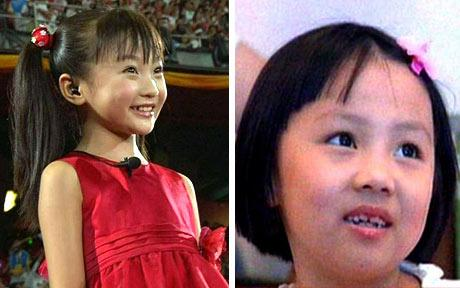
It is as if Boyle took these incidents to heart when he opted to showcase real people in his ceremony, from the volunteer performers, the nurses-turned-dancers, to the deaf and mute children’s choir. All are represented, including and especially the ugly, the weak, or the ill – if not in the stadium, then as faces printed on the sign bearers’ outfits in the Parade of Nations.
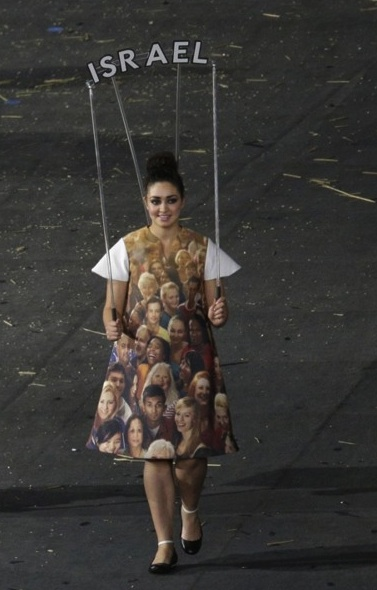
The highlight moment came when the workers who helped to build the stadium were lined up to welcome the Olympian fire. Their (less-than-five-second) presence almost outshined that of David Beckham in the final stage of the torch relay.
Boyle also spared no effort in highlighting what he believed to be the two best things coming out of the United Kingdom: children’s literature and the National Health Service. While the latter was bound to strike a nerve in election-year America, where socialism remains a dirty word if not a weapon for the Right, it also led some Chinese to ponder on the apparent contradictions within China’s own “socialism with Chinese characteristics.”
Children’s literature, on the other hand, opens another set of questions about culture and power. Compared to the cultural artifacts on display in Beijing, the British-originated products showcased in London are much more global in appeal. No matter how elegant Chinese calligraphy or how flamboyant Peking Opera might appear to foreign eyes, they remain confined to the realm of the exotic Other. In no position are they to compete with the array of globally celebrated figures on the London stage, from Peter Pan to Harry Potter, from Sir Paul McCartney to Mr. Bean. While it was surely breathtaking to see the Chinese gymnast Li Ning fly around the stadium in the style of a Kung Fu master, nothing can beat the Queen’s jumping out of a helicopter in the manner of a Bond girl. More than clearly demonstrated is the hegemony of global Hollywood – of which Boyle is part – as well as the industrialized and hence inherently globalizing cultural system it represents.
There is, however, a similarity between the two ceremonies. Just as the entire twentieth century was rendered invisible in the Chinese spectacle, the era of imperialist-colonialist expansion was also non-existent in the UK version. One may argue that Beijing downplayed its Maoist revolutionary subjectivity precisely to prevent an outburst of the West’s post-Cold War paranoia. For Boyle, the job of displaying agents of social change is much easier within a fairly coherent system of civil disobedience, hence fulfilled by presenting on screen the nineteenth-century suffragettes. As if to strike a more deadly blow, London’s bearers of the Olympic flag consisted of human and civil rights activists, whose Chinese equivalents, as it is well publicized in Western media, are a perennial headache for Beijing.
A critical engagement with the universalized particularity of human rights is beyond the scope of this essay. But a comparison between two key scenes of the ceremonies in Beijing and London would suffice in calling attention to the unequal power relations that persist in a postcolonial world order.2 So far, no one seems bothered by the fact that it was not the Queen herself who jumped out of the helicopter in the London spectacle. Some, however, were deeply troubled by a similar use of cinematic montage in Beijing as to call it a “fake”: the firework-footprints that brought the twenty-ninth Olympiad to the Bird’s Nest on the television screen was found to be recorded rather than live, even if real fireworks did take place outside the stadium.
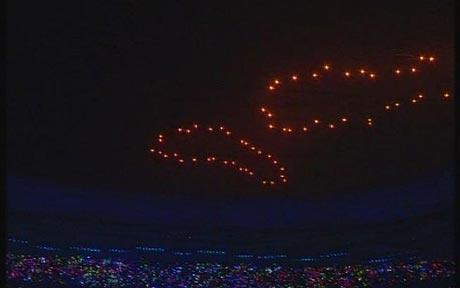
Surely, in the London case, Her Royal Highness’s agreement to shoot the scene at all is already baffling enough. To question the identity of the jumper would appear to destroy the British humor so fully exhibited. But the absence of this questioning speaks to a deep-seated acquiescence of power. To be sure, the royalty-turned-celebrity is not the same as the old imperial throne that ordered the Opium War. But one cannot help but notice the contrast between the taken-for-grantedness of this hierarchy and the simultaneous tendency to view the Chinese state (alone) as an embodiment of absolute power.
Ideologically framed discrepancies of this kind are so prevalent that an alternative reading of the Beijing ceremony is almost impossible. But the effort is worthwhile nonetheless. In an opening scene of the 2008 event, 2008 Chinese soldiers performed on an ancient percussion instrument called fou. While their bodily movement reflected the vast human labor behind “made in China,” the effect of their collective actions composed a digitized landscape.
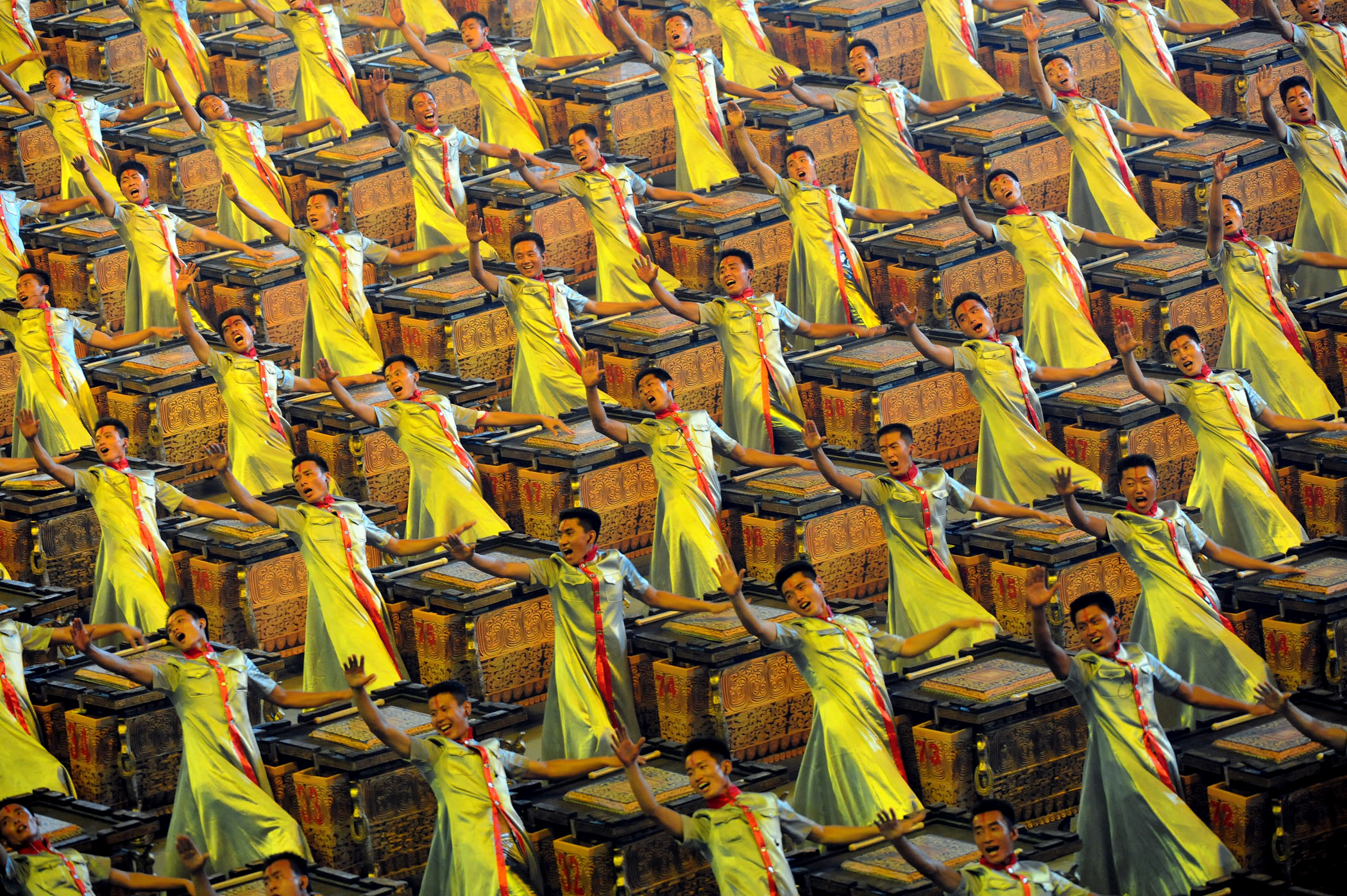
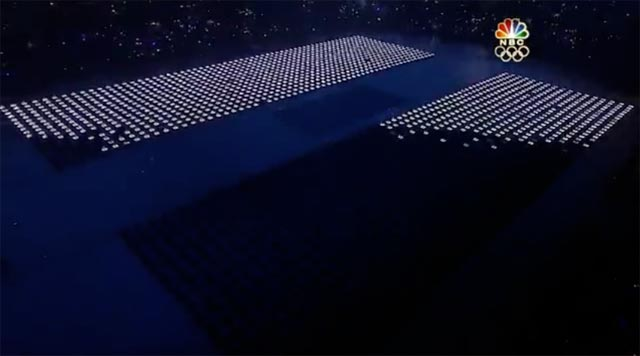
Implicit is a commentary on the human cost of China’s rise, a display of mass subject that offers an opening to critique the real productive conditions of the information age. This representation of subjectivity stands in stark contrast to Boyle’s boy-meets-girl-via-cell-phone story. In that new-media-saturated narrative, the society of spectacle operates in full force: machine commodities displace social relations, screens blind players from seeing the game, and class consciousness is fragmented by the hidden codes of the communications network.
Image Credits:
1. The Olympic Stadium in London
2. Left – Lin Miaoke, the “face”; Right – Yang Peiyi, the “voice”
3. Volunteers’ faces printed on the outfit of a sign bearer
4. The “Faked” Footprints
5. The Soldiers Performing Fou
6. The Digitized Landscape Composed by Human Labor
Please feel free to comment.
- One may argue that this contrast also applied to the 2010 Vancouver Winter Olympics. [↩]
- For a more detailed analysis of this unequal power relation through the “fake” incidents at the Beijing Olympics, see Fan Yang, ‘The Politics of Exhibition: China’s “Fake” in the 2008 Beijing Olympics’, antiTHESIS, 19 (2009), 56–70. [↩]
Pingback: Fan Yang, Media and Communications Studies, on FlowTV | UMBC Insights Weekly
Pingback: Links Roundup #3: On The Contrary « STEVIE VULTURE
I think this is a good comparison between the two; most UK responses I’ve read on the web also made the comparison between Beijing/uniformity/statism and London/incoherence/democracy, like here.
It’s interesting too that people’s responses to 2012 are very concerned with the appropriate definitions of Britishness, generally delimiting which aspects of British culture through history are acceptable: Amy Winehouse, morris dancers or hip-hop? Representing ‘Britain’ in the ceremony is consistently discussed as a difficult problem.
I wouldn’t agree with your point about the Queen though; I don’t think not questioning the identity of the jumper is an acquiescence to power but to comic pleasure. Viewers were not intended to accept the proposition that the Queen was leaping out of a helicopter but rather that it would be funny if she did, alongside a fictional spy. In contrast, the firework CGIs on the broadcast was created to look real so viewers believed they were real; the article you link to claims the footage “inserted a slight camera shake effect to simulate the idea that it was filmed from a helicopter.”
It’s the deliberate creation of fake artefacts of liveness without textual clues to their fakeness (eg. James Bond is not real) that separates Beijing’s fireworks from the Queen’s parachute jump and produced key criticisms of fakery. (Though I would agree that an ideological dislike of Chinese political culture, and the notion that the Olympics is about personal skill and effort, not technology, also plays a part in making the criticisms emotionally charged.)
I have been delighted to read Dr Fan Yang’s perceptive parsing of the OG Opening ceremony in Beijing and London respectively. I watched both from the comfort of my living-room armchair, and of course the conjunction of both events invited such a comparison. Or perhaps there is always an Olympic record to beat from one opening ceremony to the other. At any rate, Fan Yang’s astute analysis is very much to the point; it is a stimulating piece that is also nicely written.
What had struck me most in the London Opening was the way in which the British unabashedly displayed their history as if it had been all if not smooth at least good-natured. It was all pastoral as the initial scenes tended to stress with shepherds, shepherdesses, and sheep; and certainly humorous — funny and fluffy as it were — with a figure of Her Majesty jumping in parachute with a figure of a fictional spy. While there was humor galore; there was also mere irony, the peak of which I found in the display of the mid-19th century industrial revolution and the emergence of a strong social class struggle. I mention irony here because, by contrast, the Beijing games had so little to say about such struggle while in London the British seemed to have basked in the historical turmoils through which they went.
Were I to write about the OG, I would probably focus on the commentaries, which are the filters through which we are forced to telespectate. I would do so now that I have seen so many OG without having ever been “there” and can compare American coverage and French coverage, and now that I have been submitted without mercy to the insistence and persistence of reporters at interviewing athletes who had already given all they had in their physical performance but had absolutely nothing to say. From Paris, it was almost comical because the French reporters all speak (some) English and thus had to translate for the French audience what the athletes stated; most often, they paraphrased or even just invented what the athlete could not really say or did not want to say. In common between the American and the French reporters, there is the need to invent a narrative that be compatible with the fantasy of their respective audiences. I suppose that the Chinese coverage had to do the same. In the end, there is no personal skill and effort; it is all drowned into a discourse of globalized hegemony. How more wrong could have been poor de Coubertin in thinking about Olympic truce?
Thanks very much for your comments, Matt and Jean-Paul!
I would like to respond to Matt’s point regarding the comparison between the Queen and the firework footprints.
In a longer piece about the “fake” incidents in Beijing, I have argued that part of what gave rise to such “emotionally charged” (as Matt puts it) criticism was an anxiety toward “China in real time.” That is, the West (however imprecise the term might be nowadays), long accustomed to a China fixated in Orientalist “past time,” is not used to seeing live events beamed from a non-West region that is staged rather than having to do with, say, a natural disaster or war. (Olympics was held in the non-West only twice before 2008.) This is why the “fake footprints” became news-worthy in the first place.
As Matt points out, Bond is “not real” in the sense of a historical character. But if we may invoke a Baudrillardian argument about reality, Bond can also be seen as every bit as real as the Queen. Both, as images that circulate the now globalized cultural industry, are granted a status in our mindset to “be real” even if they are “fake” momentarily (when jumping out of a helicopter, for example). Without this establishment of their “real” status, the humor effect would be hard to achieve. In that sense, I am critiquing our acquiescence to an ideology of cinematic reality more so than the acquiescence to royal power, which ties to my point about the global Hollywood hegemony.
That said, the fireworks were certainly made to look real and real-time. I recall reading that the artists said they chose to pre-record it so as to enhance the clarity of the pictures shot in the air. The absence of a pre-show disclaimer (that this is a film, like all the other films shown at Opening ceremonies, such as Boyle’s) also speaks to China’s obsession for perfection of its self-projection; its emerging global subjectivity depends on its becoming an object in the eyes of global media.
An additional irony is that in the US, the Beijing event wasn’t broadcasted live anyway but rather delayed exactly 12 hours to fit the prime-time schedule that would ensure audience ratings and the inflow of advertising revenue. At work is television’s “ideology of liveness,” which I believe we should continue to examine critically.
Again, I really appreciate Matt’s taking the time to ponder on these differences and giving me an opportunity to clarify some ideas. Hope to hear more of your thoughts, as well!
Haberleri en hızlı ve doğru şekilde sunan site, tebrikler!
Güncel olaylar hakkında en iyi bilgi kaynağı!